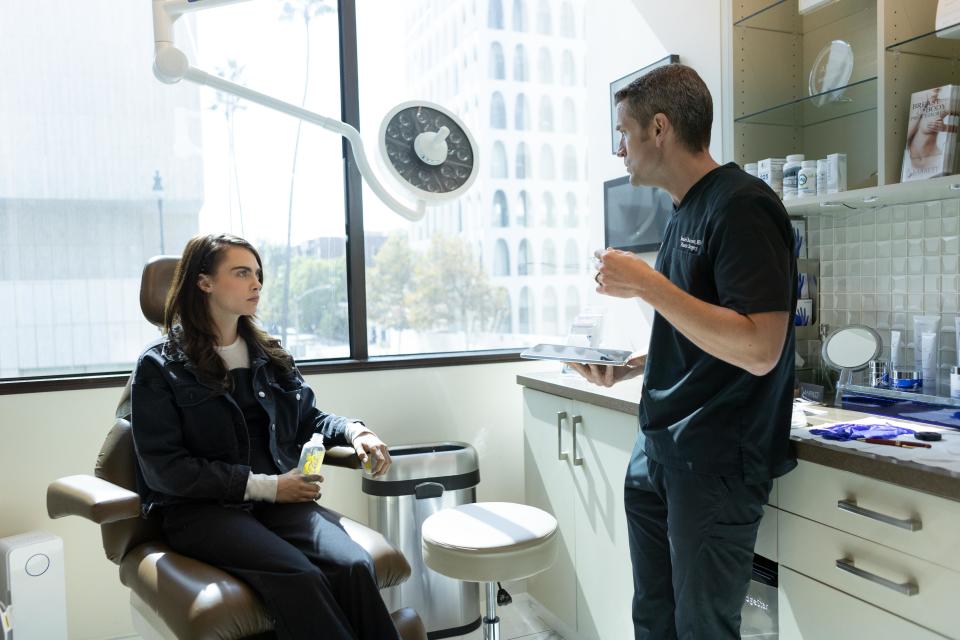Premium Factual Distributors Are Facing Up To A “Fewer, Bigger, Better” Future – London TV Screenings

The last year has been a chastening one for television, with budgets nosediving and streamers pulling back on the mega-spending of yesteryear to offset financial disappointments. But the investment in eye-catching doc series has continued despite the threat of global recession, and the unscripted market now finds itself at a crossroads as it splinters into expensive, premium fare and low-budget, high-volume returners.
“There’s still big appetite from commissioners,” says one prominent UK doc maker, while a German-based factual producer adds, “What’s being sold are very commercial projects – bankable names and directors.”
More from Deadline
Peacock Lands Non-Monogamous Island Dating Format From Fremantle Label Naked
Alan Carr Lands Debut BBC Primetime Quiz With 'Picture Slam'
Dogwoof Head of Sales Cleo Veger believes there’s a bigger divide than ever between the sales of lower-budget festival docs and premium projects. “There’s a drive towards IP and buyers are talking about ‘fewer, bigger swings’,” she adds.
Projects with big names attached are commanding big bucks – Veger points to Davis Guggenheim’s Apple TV+’s feature Still: A Michael J. Fox Movie, which looks into the life of the beloved Back to the Future actor and premiered earlier this year at Sundance. “There’s so much competition between streamers, broadcasters and cinemas and big name recognitions helps,” she adds, noting high-profile organizations, events and sports can substitute for big-name talent in the premium docs genre.
For buyers and sellers heading to the London TV Screenings this week, the challenge has become one of smart investment – is ‘going big’ still the best policy or will a more measured approach win out?
“The value of premium docs has been going up for a while and it’s because SVoDs are paying more for films. Sometimes it’s like being in an auction house: everybody wants the same story and the bidding gets crazy,” says one source at a super-indie. “There is a correction going on as the value can’t keep going up and up — it’s unsustainable and the streamers know that.”
There is clearly still value in the unscripted market, evidenced by big-ticket acquisition deals such as Sony Pictures Television’s $350M acquisition of Industrial Media, North Road Company’s $200M purchase of Red Arrow Studios and Shamrock Capital paying what’s understood to be a nine-figure sum for a stake in Last Chance U maker Boardwalk Pictures. Premium factual was the driver behind ITV Studios’ $126M capture of Tiny Planet firm Plimsoll Productions and Fremantle’s deals for The Real Elon Musk producer 72 Films ($46M for 55%) and Elephant maker Wildstar Films ($13.3M for 51%). These deals certainly did not come cheap.
“Four or five years ago no one had any interest in buying documentary companies but now they are making globally-popular, streaming heaven,” says one dealmaker in London. “They have to be making premium factual or BBC natural history-type shows, and then they’ll attract attention.”
Mandy Chang, Fremantle’s Global Head of Documentaries, says Netflix and other streamers have “taken on premium programing and proved there’s an audience for it.” This support from the big players has revitalized interest in the genre, our M&A sources say.
Among Fremantle’s latest premium doc titles is Misfits Entertainment’s Kingdom of Dreams, a four-part series chronicling the fashion world over three decades – from the early 1990s to the 2010s, exploring how fashion exploded beyond the elite fiefdoms of haute couture and style – Paris, Milan, London and New York. HBO Max has rights in Europe, Latin America, Asia and Bell Media’s Crave is on board in Canada. Fremantle retains worldwide sales.

Other key premium titles on the slate include David Redmon and Ashley Sabin’s Sundance title Kim’s Video about the fate of Yongman Kim’s legendary 55,000 rental movie library in New York City, and the talent-led Planet Sex with Cara Delevingne, the BBC Three and Hulu doc series in which the model and actress goes on a voyage of sexual discovery.
Chang is a former BBC Storyville boss with credentials in everything from indie to commercial docs. She joined Fremantle in 2021 to spearhead a push into the premium end of factual and says her company’s slate reflects a market that still relies on a wide genre spectrum. “It’s an ecosystem where different types of docs have their place,” she says. “There’s only so many premium films to be made and there isn’t the talent to sustain them forever.”
For smaller indie producers working in premium docs, the challenge is competing financially. One German indie producer says partnering with larger domestic rivals offers a solution. “We cooperate with many of the big companies here,” they say. “That works well, leads to big co-productions and means we can still try to get our own access.”
All3Media International, part of the UK-based super-indie group that owns the likes of Don’t F*** with Cats and The Tinder Swindler maker Raw TV and natural history producer Silverback Films, has taken the partnership approach in several recent premium docs projects. The distributor is shopping Spacey Unmasked, a buzzy doc mini from indie Roast Beef Productions about the life of House of Cards actor Kevin Space, who is preparing to face trial for sexual assault charges in the UK.
All3Media International and Roast Beef similarly teamed for 2021 doc special Who is Ghislaine Maxwell?, which examined the jailed socialite ex-partner of sex offender and financier Jeffrey Epstein. The series began as a 90-minute feature doc for Channel 4 but was supersized to three parts when Starz boarded the project and enlarged the budget.
“Co-production in docs was once seen as something for smaller channels but now it’s become a way to work with like-minded partners,” says Rachel Job, All3Media International’s Senior Vice-President, Non-Scripted. “Buyers are even saying, ‘Have you spoken to this network about this project?’”
All3Media will also be debuting The Man Who Played With Fire, a big budget Sky Documentaries and Discovery+ four-part series from Raw TV about Millennium trilogy author Stieg Larsson’s investigation into the assassination of Swedish Prime Minister Olof Palme in 1986.
Acquisitions execs and commissioners are showing no signs of slowing down at the top end of the market, Job adds, but it’s not so easy elsewhere. “Outside the premium space is a squeezed middle,” she adds. “There’s always space for cost-effective, high-volume docs but shows funded with pre-sales could become a challenge.”
Further to that, she warns longer-run doc series of eight episodes-plus that the streamers once favored are becoming tougher to finance and sell. “Ninety-minute docs and two-, three- and four-parters comprise almost all of our premium factual slate,” she says. “To say you were investing in a 90-min doc three years ago would have been crazy, but that’s not just a theatrical sell these days, and to find a really good story over 10 episodes is really hard. We get pitched six-to-eight-parters all the time and often we’d prefer them to be three or four. Those are easier to finance and many buyers are moving to a ‘fewer, bigger, better’ strategy.”

For Dogwoof, a stalwart of the indie docs scene, the Screenings will be a time to push titles such as Copa ’71 about the unofficial women’s soccer world cup of 1971 that was largely dismissed and written out of history by the game’s authorities. Rachel Ramsey and James Erskine, who’ve worked together on the likes of This is Football, Le Mans: Racing is Everything and Sachin: A Billion Dreams, are the co-directors.
Up for discussion at the Screenings, Veger points out that distributors are being forced to take a long-term sales approach. Gone are the days of waiting for finished product to hit the market without a vendor attached and, as such, the company has been getting involved in projects at a much earlier stage.
“More and more, people are working directly with producers, and there’s a lot more future planning,” says Veger. “The question is not about projects selling today but whether they can sell in three or four years. How evergreen is a story and can it stay relevant?”
For the premium docs market, the London TV Screenings will provide a snapshot of where the genre is headed.
Best of Deadline
Sign up for Deadline's Newsletter. For the latest news, follow us on Facebook, Twitter, and Instagram.

